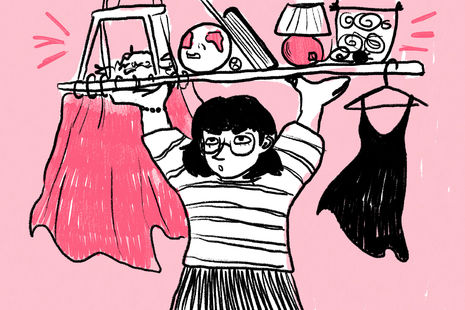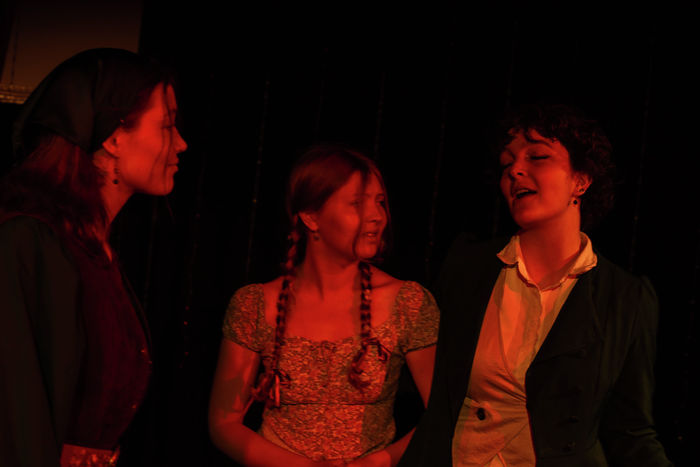The fine art of stage management
Iris Jopp shines a spotlight on the most underappreciated role in theatre

From the popular image of figures dressed in black, moving set pieces to and from their marks under the cover of darkness, it’s fair to say most people think that the main responsibility of stage managers is heavy lifting. This is certainly what I thought at least, watching from the plush velvet chairs of the audience. Having since peered behind the curtains and worked behind the scenes in Cambridge theatre, it has become clear to me that stage managers are some of the most proactive, efficient, and competent people I have ever worked with. The role of a stage manager starts well before opening night, often being part of a show for as long as the director (… in theory – it won’t come as a surprise that theatre in Cambridge does like to test the last-minute-limit). ‘Stage manager’ is an understatement for what the role requires, and I can only imagine that is because ‘prop-sourcing-health-and-safety-overseeing-tech-organising-therapy-giving-hero’ is too long of a title. It’s time we all learnt what stage managers actually do.
“‘Prop-sourcing-health-and-safety-overseeing-tech-organising-therapy-giving-hero’ is too long of a title”
The stage manager’s responsibilities begin with the practical and logistical thinking through of everything the director wants. Every mimed prop an actor adds becomes another bullet point in the prompt book, a fully annotated script containing all lighting, sound, prop, and set cues. Then it comes to the sourcing of props while working to a tight budget. Stage managers ask the specific questions no one else thinks of. The director needs a table. What dimensions? What period/style? The director needs a packet of crisps. What brand? What flavour? Will they get eaten on stage? Then it’s the job of the stage manager to find the props, either from the ADC storeroom, people’s possessions, the charity shops of Cambridge, or Amazon Prime (a popular choice). The stage manager makes it happen.
During the tech run – a rehearsal focused only on the technical elements – the stage manager is in charge, meticulously leading the cast and crew through every cue, until the tech team is confident. After the ‘get-in’, when the show opens, the stage manager ‘calls’ the show from the prompt desk, giving cues to lighting and sound operators and crew while also communicating via ‘cans’ (headset system) with backstage and front of house. Duties can be split up between Stage Managers (SMs), Deputy Stage Managers (DSMs) and Assistant Stage Managers (ASMs) – the latter normally joining the production late in the day – but it’s pretty much all hands on deck.
And we’re not even done! At the ADC, they are also responsible for the health and safety of a show including: evacuating the cast and crew in an emergency, carrying out risk assessments and warning the cast of hazards, carrying out a pre-show checklist, storing dangerous items, and reporting any incidents.
“A cool disposition is a valuable trait in any stage manager”
But the most interesting thing I found when reading about and talking to stage managers is how much the job is about people-managing and effective communication. In Gail Palin’s Stage Management: The Essential Handbook (a book that I’m sure is on the bedside table of any good stage manager), she has a whole section on ‘assertiveness training’. She outlines what body language and tonal qualities are best for a productive work environment and provides a self-care section on how to manage yourself, your time, your stress and others. ‘The CUADC Guide to Stage Managing’ advises: ’Try not to get too involved in arguments. Be a peacekeeper by all means, but know when it’s best to stay out of a ‘creative disagreement’’. Seasoned Cambridge Stage Manager Ameila Barry explains, “Although you’re not necessarily formal welfare, a lot of the time you end up providing encouragement or a shoulder to lean on when things are stressful” and that “it’s important to give [the cast and crew] encouragement”. A cool disposition is a valuable trait in any stage manager.
This is not to put off any budding young stage managers; by all accounts it’s a really exciting, fulfilling job. Organisation, adaptability, problem solving, multi-tasking and proactiveness are some of the (infinitely transferable) skills cited by stage managers K-M White and Amelia Barry. Everyone wants a show to go well, and the stage manager is the person who can make that happen. “Being able to know that the audience had a good time regardless of what may have happened backstage is what makes it worth it,” says White. (He also told me another story that ended with him “silently screaming in the wings” during a scene where “milk would end up on the safety curtain or splashing audience members”, but I think we’ll save that for another time…)
So here’s to the stage managers! The cog in the machine that keeps the show rolling, and the unsung heroes of the theatre world. Never again will I take for granted the organisation that is required behind the scenes to make the show look seamless, and if I have any message to audience members it is that theatre does not happen by accident. And to any directors reading, please buy your stage managers a drink.
 News / Caius mourns its tree-mendous loss23 December 2025
News / Caius mourns its tree-mendous loss23 December 2025 Comment / Yes, I’m brown – but I have more important things to say22 December 2025
Comment / Yes, I’m brown – but I have more important things to say22 December 2025 News / Cambridge welcomes UK rejoining the Erasmus scheme20 December 2025
News / Cambridge welcomes UK rejoining the Erasmus scheme20 December 2025 News / CUP announces funding scheme for under-represented academics19 December 2025
News / CUP announces funding scheme for under-represented academics19 December 2025 Interviews / Politics, your own way: Tilly Middlehurst on speaking out21 December 2025
Interviews / Politics, your own way: Tilly Middlehurst on speaking out21 December 2025









